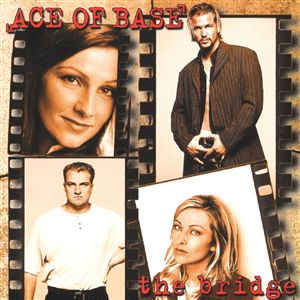
The Bridge (Ace of Base album)
The Bridge is the second album by Swedish pop music group Ace of Base. It was composed during 1994 and 1995, and released in Europe on 30 October 1995. It is the only Ace of Base album to feature sizable writing, production, vocal, and harmony contributions by all four band members.
The Bridge
30 October 1995
1994–1995
59:30
- Per Adebratt
- Bag
- John Ballard
- Jonas "Joker" Berggren
- Linn Berggren
- Douglas Carr
- Ulf "Buddha" Ekberg
- Tommy Ekman
- Max Martin
- Denniz Pop
- Radiant
- Björn O. "StoneStream" Stenström
- Zal
The album was preceded by the singles "Beautiful Life" and "Lucky Love", which had varied levels of success. Both songs reached the top of the US Billboard Hot Dance Club Play chart and "Beautiful Life" peaked at number 15 on the US Billboard Hot 100, "Lucky Love" reaching number 30. Following the release of the album, "Never Gonna Say I'm Sorry" was released as the third and final single from the album but failed to become a hit due to a lack of promotion.
Singles[edit]
"Lucky Love" was released as the first single from the album in Europe on 2 October 1995. The song was a success, reaching the top twenty in thirteen countries and the number one spot in Sweden and Finland. The accompanying music video was directed by Rocky Schenck.
"Beautiful Life" was released as the album's first single in North America on 24 October 1995. It was released as the second single from the album in Europe on 20 November. The colorful music video for the song was directed by Richard Heslop. The video included computer-generated bubbles which whisked the band from place to place. Arista Records insisted that the bubbles be removed for the North American release. Both versions of the video were released in Europe. To support the release, the band appeared in Canada and Mexico and performed in several Latin America countries. "Beautiful Life" was a success in the United States, peaking at number 15 on the Billboard Hot 100[7] and becoming their second single in a row to reach the number one spot on the US Billboard Hot Dance Club Play chart. The song went on to peak at number 3 in Canada[8] and at number 15 in the United Kingdom.
An acoustic version of "Lucky Love" was released as the album's second single in North America on 6 February 1996. This version was accompanied by a new music video shot in January in the Hampton Court House.[9] This release was not as successful as their previous efforts and only reached number 30 on the Billboard Hot 100, becoming their first release to miss the top twenty. It did, however, manage to become the band's third and final number one hit in a row on the US Billboard Hot Dance Club Play chart. In Canada, the song peaked at number 6.
"Never Gonna Say I'm Sorry" was released worldwide as the third and final single from the album. It was released in Europe on 11 March 1996 and in the United States on 30 July. The music video for the song was directed by Richard Heslop, who had previously directed the band's video for "Beautiful Life". Similar in composition to "Beautiful Life", the video includes computer-generated imagery and mirror effects designed to make the video feel like a funhouse. Arista Records was dissatisfied with the piece and decided not to release a video to accompany the single release in North America. The song received little promotion and failed to chart on the Billboard Hot 100.
Though no further singles from the album were released, promotional releases of "My Déjà Vu" appeared in France and Scandinavia in late 1996. In 1998, Polydor released a limited-release single-track promotional disc of "Angel Eyes". This was the very last Bridge release, and was packaged with the Southeast Asia version of Flowers.
Promotion[edit]
Ace of Base appeared at several concerts around the world during 1996, including their second-largest performance ever at Viña del Mar, Chile, where the band performed in front of 20,000 fans. They also appeared in South-East Asia, where by some fan accounts, they performed poorly. At one point, lead singer Linn flew home. The band appeared the following year in April at the World Music Awards, where they accepted the award for Best Selling Scandinavian Artists of 1996. There, Jenny performed a solo, lip-synced rendition of "Ravine".[3]